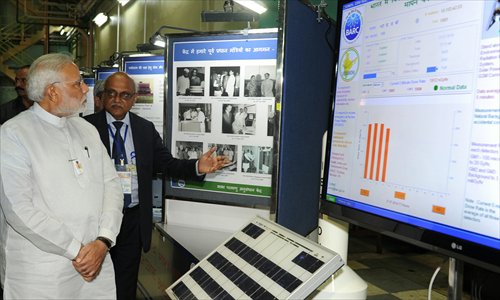Modi govt cleaning house
Indian bureaucracy shaken up, more transparent after election win

Indian Prime Minister Narendra Modi (left) is briefed by Chairman of the Atomic Energy Commission Dr R.K Sinha at an exhibition at the Bhabha Atomic Research Centre in Mumbai on July 21. Photo: AFP
New vigor is sweeping through government offices in Delhi under the Narendra Modi government, which took over barely two months ago.
Ministers are conducting surprise checks in the morning to see if bureaucrats are in their seats, offices are being thoroughly cleaned and all old furniture thrown away, senior officials are under orders not to keep files pending, and ministers are clearing files, including many left over from the previous government, in a jiffy.
Successful methods
Prime Minister Narendra Modi, who took office on May 26 after steering a spectacular victory for his Bharatiya Janata Party (BJP), has brought with him to New Delhi his successful methods as Gujarat's chief minister.
The new prime minister is known to pack in around 18 hours a day. He is up and running at 5:30 am and works till well after 1 am
Government officials have been ordered to clock in at 9 am every day, and are expected to sit beyond 6 pm - when the day is supposed to end - to clear any extra work. Saturdays are no longer holidays and the officials frequently take work back home. Senior bureaucrats, like the secretary of any department, have to ensure that the precincts of the office are spick and span - no dust, no old furniture lying around, no paper files piled up on desks, no betel leaf-stained corners.
Orders to this effect were passed as soon as Modi took charge. All offices were sent a letter via Cabinet Secretary Ajit Seth asking officials to keep their offices clean, papers neat, and corridors unblocked.
The prime minister has also directed that officials should take to the electronic way to clear files. Tech savvy Modi, 63, has directed that officials should not have piles of files littering their desks and everything should be computerized.
He has also directed that the bureaucrats, known as "babus" in Indian terminology, should cut down their lunch breaks.
Lower-level bureaucrats and their aides under the previous regimes were notorious for their long breaks.
During winters the sprawling lawns near the central government offices in Delhi would be filled with government officials - chatting, eating, and napping - during the prolonged lunch time, while senior officials would be off to exclusive clubs or golf clubs.
All this has come to a halt with the Modi government.
The prime minister himself has been keeping tabs on office cleanliness.
During his initial days in office he took rounds of the Prime Minister's Office, walking the corridors and looking into every room - something that his predecessors are not known to have done.
He is reported to have frowned at the unkempt corners, the piles of dirty tea cups and plates, and loitering officials.
His ministers, taking a cue from the prime minister, have been conducting surprise inspections of their respective ministries.
Last month, Urban Development Minister M. Venkaiah Naidu reached his ministry office in Nirman Bhawan at 9 am and found the offices of many officials empty.
The minister found electric wires dangling in the corridor and expressed his unhappiness at the shabbiness of the premises. Meanwhile, Information and Broadcasting Minister Prakash Javadekar arrived at his ministry office in Shastri Bhavan at 9:15 am late last month to find many vacant chairs.
A circular was also issued to officials warning them that disciplinary action would be taken against them if they are late again.
"Under the previous government, most officials would arrive at 11 am or even later and be off by 6:30 pm. They would never work on Saturdays, unless necessary. Now, everyone is in office on the dot in the morning. The senior officials stay till 8 pm and work regularly on Saturdays and, if required, even on Sundays," a senior bureaucrat told the Global Times, declining to be named.
"Everything is moving fast under the new government - files are being cleared in minutes, decisions taken fast. The top officials are inspecting their offices, even the toilets, to ensure everything is neat and clean. Under the previous government, no one seemed to work. Most of the officials are welcoming about the new work culture," another official said, unwilling to be quoted.
Improved visibility
"Some people might be saying that Modiji is trying to centralize power, it's totally wrong.
"Discipline and close coordination within a system cannot be termed as dictatorial in any manner. We are trying to bring some discipline in our working system, everything is being streamlined. It has to be seen from this perspective," Junior Home Minister Kiren Rijiju, who is affiliated to Arunachal Pradesh, is quoted as saying recently.
French Foreign Minister Laurent Fabius also remarked on the perceived efficiency of the new government. Fabius, voicing keenness that the new Indian government should conclude a multi-billion dollar deal for fighter aircraft that has stalled for two years, said France shared the "notion of efficiency in the new government's approach."
Modi's government is far more visible than previous governments.
He has two twitter accounts -@narendramodi, from when he was chief minister of Gujarat, which has over 5 million followers, and @PMOIndia, after he became prime minister, which has nearly 2 million followers.
The two handles are constantly updated and are a constant source of information to the public. Most of his ministers have also opened twitter accounts to keep the public updated.